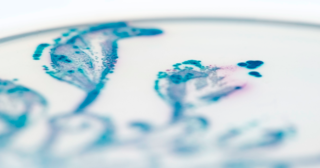Health
The Future of the Microbiome
The study of microbial waste opens new frontiers in health and disease.
Posted March 21, 2019

In the last decade or so, we have increasingly appreciated the true significance of the interactions between a human host and trillions of beasties living on the skin and in the gut. This has led to a huge increase in the number of studies on the microbiome, and all sorts of (over)promises about perfect health and happiness with microbiome manipulation. We can’t really blame scientists and lay people for getting too excited. It was as if we discovered an entirely new organ, one with links to many important systems in the body and one that we could manipulate with food, antibiotics, and probiotics. But the problem is, the microbiome is far more complex than a kidney or even a brain.
Most of the early research focused on categorizing the beasties. Certain bacteria (and yeast and fungi and eukaryotic parasites and other obscure archaea) tend to live in healthy people, other ones in obese people. There were differences in the microbiome of certain hunter-gatherer tribes like the Hadza. We had observational studies with data that took a supercomputer to crunch. But we could already figure out that a perfect microbiome didn’t exist—that your own microbiome changes to adapt to new circumstances and foods and experiences. A Hadza microbiome transplant or a probiotic supplement based on Hadza microbiomes will not make me slender and healthy, because I don’t eat or live as the Hadza do.
The number and classification of the microbiome may not be the most important factor after all. We’re looking at ecosystems, different ecosystems within each person. Just as ecosystems on our planet have different animals in different places playing similar roles (reindeer and bison are the ruminants in the far north, wood deer and goats in the dry southwest, kangaroos in Australia), so does the microbiome of each person. Maybe what is important is not the little beastie itself, but the role it plays among the other beasties. We can figure this out, to some extent, by seeing the metabolic end products of the microbiome. The study of the output of the microbiome is called metabolomics.

Metabolomics means, essentially, that we measure what the microbiome makes from what we feed it. This generally means taking people and measuring metabolic end products in the urine and poo, typically with mass spectrometry, gas or liquid chromatography, or nuclear magnetic resonance spectroscopy. These methods involve letting a liquid sample run along a filter or shooting a sample into a machine and figuring out what is in the sample by the different size and wiggle of the molecules.
From this information, we can determine all sorts of things. Which metabolic end products are associated with healthier humans? Which microbiota are the reindeer of my microbiome or the kangaroo of his? Which metabolic end products are associated with greater adherence to a study diet? Yes, your microbiome end products can literally tell on you if you cheat on a diet. By attaching the structure of the microbiome to the primary metabolic function of the microbiome, we suddenly have a whole new dimension to anchor those trillions of data plots we have from madly categorizing all the beasties.
This new field of study also requires some new biochem vocabulary words, like betaine, propionate, acetate, and butyrate, and a new understanding of what it means for a microbiome to be “good” or “bad.” Following the metabolomics in human health and disease may be far more helpful than classifying the microbiome down to every trillionth beastie.
It’s the dawn of yet another new scientific era, and papers like this one are starting to pull together the threads of the microbiome, dietary patterns, and human health and disease. The good news is, manipulating the metabolome may be a lot easier than the microbiome itself (after all, we’re talking a few dozen to hundreds of chemicals here, not trillions of microbes all with complex interrelated interactions). The future of the microbiome is not necessarily in the microbes themselves, but in what they make.
More questions about gut, human health and disease? Try these posts:
The Gut-Brain Connection, Mental Illness, and Disease
The Cutting Edge of Gut Health and Disease
When Probiotics Make You Worse
Copyright Emily Deans MD


